First -- an Intro/ diatribe -- more of a diatribe... 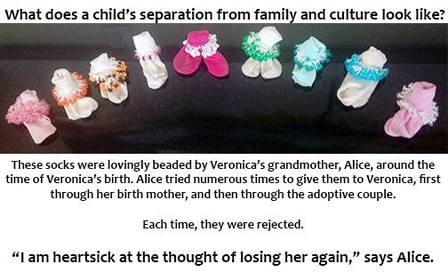 Finally. My post about the "Baby Veronica even though she isn't a baby anymore and has been living with her loving, caring father for the past two years so now she is four, which, any four year old would tell you they are not a baby" case. It's taken me a good long while to sit down and write something, anything about this complicated (not so complicated) case where a Cherokee father (Dusten Brown) contests the adoption of his daughter to a Non-Cherokee/Non-Native family. If you need a history there are plenty of places to get information. Don't go to CNN or the Dr. Phil show but try -- Indian Country Today or the National Indian Child Welfare Association. In a very long story short, Dusten Brown is the biological father of "Baby Veronica" and Melanie and Matt Capobianco are the "adoptive couple." All people in this case want to raise and love and care for Veronica. One side says that they legally obtained the right to adopt Veronica and that it's not fair that Dusten Brown changed his mind and decided he wanted his daughter and took her away under the Indian Child Welfare Act after she had been living with the prospective adoptive couple for two years (they never officially adopted her, FYI - an important distinction as pointed out to me by some savvy readers). The other side says, Dusten Brown never wanted Veronica to be adopted by anyone, and he was fighting for two years to get her back. She has since been living with Dusten Brown in his care, for the past two years. Now he's fighting to keep her. In the past few weeks the South Carolina court has ordered Veronica returned to the adoptive couple. Veronica has been assigned her own lawyer fighting for what is in her best interests. Her father has been arrested while training as part of the National Guard. The biological mother has retained an attorney who is making TV appearances with the adoptive couple. And the authorities in Oklahoma have said that they won't intervene until the Oklahoma courts tell them to. I've heard, read, listened to and tried to processes a lot of information from "both sides" of the story. I cannot say that I tried to approach it "objectively" or "from all perspectives" because, in my case, the answer here seems really super easy. Veronica belongs with her father. She belongs with her father and her extended family. Not because we have to blindly make all children stay with their biological parents all the time, not because he is Native and she is Native, not because I think non-Native or white couples who want to adopt minority children cannot be their real parents, and not because I disrespect or discount the legitimacy of the "adoptive couple"... but because why wouldn't they want her to be with her father? Writing this blog entry has been hard because this case hurts. Every time I wake up and read another news alert that something has happened in the Baby Veronica case that something tends to be disheartening, ill-informed, sad, racist, jerk-ist, craziness that makes me start shake my head and wonder, what's the point? Because the true nature of people comes out with stories like this. Suddenly, we are having to defend the right of a father to be with his daughter. Suddenly the adoptive couple is making a website called "SAVE Veronica." And my immediate thought is, save her from what? From her father? From a loving home with her father? From an extended family, grandparents, cousins, aunts and Uncles? From her Cherokee heritage? SAVE her from what? For a while it seemed like what they were trying to save her from was The Indian Child Welfare Act. The law was passed in 1978. Please, take a moment. The law was passed in 1978. We are not talking about a law passed so long ago that we cannot even remember a time when it was necessary. We are talking about a law, passed in response to the CONTINUING "alarmingly high number of Indian children being removed from their homes by both public and private agencies." ICWA was designed to "protect the best interests of Indian children and to promote the stability and security of Indian tribes and families" (25 U.S.C. § 1902). ICWA has a bunch of federal requirements that apply to custody proceedings involving an Indian child who is a member of or eligible for membership in a federally recognized tribe. ICWA does not tear families apart. It does not, as was implied on Dr. Phil keep nice parents from adopting Indian babies and leave those poor Indian babies to suffer with Indian foster parents. It is not an unjust law, it is a law designed because of courts like the Supreme Court of South Carolina, or because of people like the adoptive couple in this case. They don't want to recognize the continued bias against Native people, they don't want to acknowledge their own prejudices, they don't want to believe that they are contributing to a continued exploitation of Native children, so they need a law to compel them. They need a law that acknowledges and tries to address these issues. The challenge to ICWA and to the spirit of the law, one which supports the sovereignty of Native Nations, the degradation of tribal rights in this case, it's all so very exhausting. I have struggled, truly struggled with what I want to say here, in this open space, and I have to force the words out of me, writing, deleting, writing, deleting, re-writing. Veronica Brown belongs with her father. That's the sentence I keep writing over and over again. Veronica Brown belongs with her father. 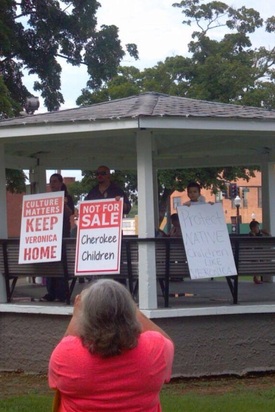 To fully process where I'm going to go with this blog entry let me begin with a random conversation I had with myself in the car when I was driving back from the Rez to my apartment in Davis. PRESENTING - THE DIALOGUE THAT ACTUALLY WENT ON IN MY HEAD THE OTHER DAY THAT I WROTE DOWN FOR YOUR VIEWING PLEASURE - or... we all talk to ourselves when we are driving in the car alone - admit it! Do you think Baby Veronica belongs with her father? Yes. I do. Because he is Native American and the adoptive couple is not? Yes, but that's not the only reason. But yes. That is one reason, but it is also not the only reason. But he gave up his parental rights and abandoned her for two years and then suddenly he wants to come back into her life and take her away? It's not fair! He actually signed a one page consent document stating he wasn't contesting the adoption, but it was presented to him in a very shady way that was essentially trying to manipulate him into giving his signature and he immediately filed to have it withdrawn. Yeah but he signed it. No take backsies! Ahh, I see we have resorted to using the three-year olds "no take backsies" defense. But he also sent text message that said he didn't want to be her dad, so there! Um once I sent a text message that said "I will never, ever eat Mexican food again" after a particularly bad experience with a drive thru taco stand. I ate Mexican the day before yesterday. (PS the text messages weren't allowed as evidence in court, because they are TEXT MESSAGES, there is a process you have to go through to truly sign away any parental right what so ever... for a reason.) Mmmm, Mexican Food. Still he signed the agreement, he did sign it, he doesn't dispute it. He signed it. Even if he did sign it (and then immediately try to with draw it) Veronica is a person. She is a child. In my humble opinion, people should be allowed a certain amount of understanding when it comes to signing away their parental rights. Did the adoptive couple try to work with him and give him all the freedom to have an "open" adoption the way they did with Veronica's mother? Did they say to him "look, maybe you want to withdraw, but we would be happy to work with you, father, the way we have worked with (ahem given a bunch of money to) the bio mother?" No, he was an obstacle for them to overcome - day one. We, as a society, should err on the side of "oh, yeah, that's something people might change their mind about. Because- as a great friend (and fierce intellect) of mine once told me "I can buy a dress from Nordstrom, wear it, and then change my mind and take it back months later and they will let me." This is a CHILD. They should at least get the same amount of time to change their mind as a dress at freaking Nordstrom (by the way, I still heart your return policy Nordstrom!) Even if he signed (which by the way, come on, it was SHADY LADY, and he immediately tried to withdraw it while he was stationed in IRAQ) and then changed his mind (ten minutes later), she's a child, not a dress from Nordstroms. We should at least consider that stepping up for a child means, yes, we want her to be able to know and love and be with her father. We should give them BOTH that consideration. Yeah but, no take backsies. I get it. It feels unfair. Because when you adopt a baby you want it to be easy. I'm not an adoptive parent myself, but from the adoptive parent's I've talked to, it's hard to live in this state of limbo where maybe, just maybe something goes wrong and suddenly you just aren't a parent any more. If some court had come in right after I had my baby girl and said "oh by the way, two years from now we are just taking her away" I would have flipped out. It's hard. It feels like there should be no take backsies. But, for me, if I was an adoptive parent, I would want my child to know their biological parents. I would want my child to know where they came from. I would listen. If the case was like this case, I would buck up and do the right thing. What's the right thing? The right thing is to let Veronica live with her loving father BECAUSE everything got so messed up when it came to the adoption process in this case. The right thing is to wish her a good, safe, stable, happy life and let her go, especially considering that's how the case should have turned out in the first place. In fact, that is how the case went in the first place. Veronica was returned to her father. Veronica belongs with her father. Not because the adoptive couple are "bad people" (although, if I was in another mood I might spend a whole lot of time talking about how they are spoiled people, they are arrogant people, they are dismissive people, and they are privileged, snobby people... but I won't go there) but because he wants to be her father. He wants to raise her, and love her, and care for her and give her a good home. He wants to be a dad. He is her dad. This should be a no-brainer. I've worked a lot with foster kids. Many of them had parents. They didn't have the kind of parents that could, or would, or tried to step up and be a real parent to them. They had parents who were in throws of drug abuse, alcohol abuse, domestic violence, criminal activity. They were taken from their parents and they were left in limbo, waiting for some other set of adults to want to be their parents. They would have loved for their parents to step up and WANT to be their parents. Dusten Brown wants to be her father. Let him be her father. The adoptive couple knows how much people love this little girl. They know what it is like to WANT to be her parent. They should understand. Yeah, you're just saying that because they aren't Native and Dusten Brown says he's Native but he's not even that Native. Okay. And this is why I teach Native American Studies. What is a Native American? There is this fascination with "how much" these "so-called" Native people are. It's based on this thing called "Blood Quantum" which is this losing game invented by the federal government to erase Native people through pseudo-scientific bureaucracy. It's a losing game you can't win. You cannot win this game. you will eventually disappear this entire race of people - Based on "how much" blood you are. And this of course begs the obvious question. If I go to the hospital and ask for the "Native blood" and get a blood transfusion where I get all new Native blood put into my body, am I now a full blood Native American person? If I cut off my hand did I happen to cut off the 1/16 of me that is Chinese and now I am mostly Native American? It's not real. It's used to call in to question people's identity as a way of excluding them so that eventually, there are no more Indian people left. Also, it doesn't pertain to the Cherokee tribe. The Supreme Court (though they might not know this NOW- cause heaven forbid they have to actually learn about Federal Indian Law before becoming a Supreme Court Justice) has long upheld the right of tribe's to decide "What Makes a (insert tribal name here)". This means tribe's get to decide, how are we going to determine our membership? Is it by "blood," is it by "matrilineal descent", is it by "any ancestral descent?" As Native people we are sovereign nations and nations get the right to decide who their citizens are, and what that means. Dusten Brown and Veronica are citizens of the Cherokee Nation. Try going to France and saying: um, I'm sorry, you're not French enough to be a citizen because you don't wear a beret and smoke cigarettes while eating a baguette. We refuse to recognize your French status because we don't feel like it. Also, we can prove you are more Swedish than French. See how that works for ya.Sacrebleu! Dusten Brown is a member of the Cherokee Nation. And (even though it's not really relevant to this case) he is an active member of the nation, proud of his heritage, and looking to pass it on to his daughter. So what you are saying is that no Non-Native couple could ever adopt a Native baby because they aren't Native. You're doing reverse racism! *Sigh* I'm not saying that. I think that's what people hear sometimes when you start talking about ICWA. They just hear "you can't have this child because you aren't from a certain race-- so there!" It's much more complicated than that, but people hear what they are most afraid of, or what they think is challenging to their identity and existence. I don't want to negate that parents are parents, no matter how that child came to them. In many Indigenous cultures people called many people their "Grandmothers" or "Aunties." We believed that there were many people who came together to raise a child. I think parents come in all shapes and sizes. I think parents happen in many ways. But. In this case - she has a father. She has a father that wants to raise her. As the adoptive parents, as the "parents" don't you look at what is the facts of the case and wonder "maybe our role, as parents who also love her, is to understand why she should be with her father? Maybe we are ALSO her parents, but not in the exact way we thought?" Aside from this case -- people do need to ask themselves why they don't want to acknowledge how important culture is to the children they adopt? You can't ignore it or rationalize it away. Or you can, but you know what, there is something much bigger than your selective ignorance that you are taking from your child - and is that what a "parent" should do? Should a parent take from their child their identity? Should a parent take from a child their history? Should a parent take from a child their family? Still though. It feels so hard to explain. I flip on the television, I see one-or-two minute reports about the case, they are ill-informed and they highlight continued colonization. I wonder why it affects me so much... Why does it affect you so much? 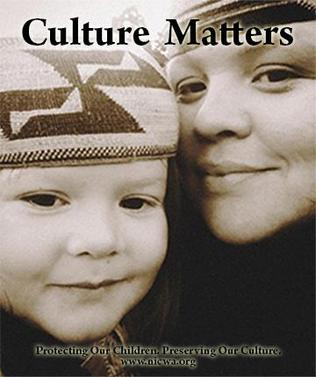 <------- That's why. That's my daughter. A few months ago the National Indian Child Welfare Association was looking for people to submit photos for their "Culture Matters" campaign -- to, in one way, call attention to one aspect of this case - culture. I submitted a picture and this was posted on their Facebook. I keep thinking about my Baby Girl. She's six now but I think of her as four. In this picture she was four. She thinks of herself as four a lot too. Sometimes we'll be talking about putting her clothes away, or getting up early to take a shower, or brushing her hair and I'll say "why don't you just brush your hair and then put your dress on?" And she'll respond "I have to put my dress on and then brush my hair, I've been doing that since I was four!" I keep thinking about her and what I would do if someone, through legal rigamaroo and mumbo-jumbo was trying to take her away from me. I keep thinking about what that would mean, that they could argue that she could live with them and be their daughter and that her culture wouldn't matter. I keep thinking about how, at four, she had already gone to many ceremonies, and she could sing along with every song, how in a few instances she would start songs for me when I forgot them because (at mmmm-something years old) sometimes I forget. I keep thinking about the notes she would write to me. "Dear Mommy, I miss you when you are gone." "Dear Mommy, I like your red dress but not your red shoes." "Dear Mommy, stop trying to make polka dot high waist pants happen." One time- AT FOUR- we were trying to tell her that she couldn't wear high heeled shoes to the dances. And she came back with a book full of Princesses wearing high heeled shoes to go dancing. She provided us with a clear, reasoned argument and even entered in exhibit A - a book. I was floored. I am floored by her every single day. She is an Indian child. Her father is white and she is an Indian child. She could probably pass for a non-Indian child if she wanted to. Maybe someone could take her far away from all of this and pretend like it doesn't mean anything, but the truth is, when she's the most upset, I will sing Flower Dance songs to her and she will stop to sing along. When we talk about her future, she tells me about being in ceremony and making dresses. When I sit to weave, she sits next to me and moves her hands along. When I ask her where she is from, though she has never lived there, she says "Hoopa." When I say "how long has our family been in Hoopa." She says "Forever. Since the very start." Culture matters. It's just one reason. It's one reason that Veronica belongs with her father and her family. It's that pull toward something much bigger than signed legal papers and rigamaroo. And the Indian Child Welfare Act matters. What's the most upsetting. What stings the most is that almost every Native person I know has a story about somebody their life (or even their own story) who was taken. An Indian child who was taken. With a family who loved them. A child who would have been protected under ICWA. A child who grew up, came back, and said "I always thought maybe I was missing something." OR "This feels right." OR "I don't have the same connection because I was taken but I am working on it." "I am glad to be home." We all have someone in our lives with this story because this, this taking of Indian children as "the greater good", this has happened to lots of Indian people. And this case - this case is a repeat. The fact that the Supreme Court forgets, and the public forgets, it all just makes the struggle of those people we know, those who were taken, sting again and again. Indian people have to fight to keep their children with their families. Society errs on the side of taking them away. They believe that is in the best interest of the child, to be away. In 2013, they believe that it is in the best interest of a daughter to be away from her father or that it doesn't matter that he is able to give her a fundamental tie to her culture and her people. In 2013 they believe that they can raise her better, because they have more money, because they have a nicer house, because they DESERVE her. In 2013, you can negate her Indian status because you feel like it. In 2013 you can tear a child away from her people. In 2013 you can rationalize and legalize the seizure of an Indian child from her Indian parent. In 2013 you can ignore her deep, personal, ancestral ties to her tribe, her family, her home. That's really hard for non-native people to understand. "Ancestry" isn't really the right word, it's your core. It's always there. I have had people come up to me after presentations and say "I just found out my Grandma or my Great Grandma or my Great Grandpa was some kind of Indian. And I don't know if I'm supposed to say that. I don't know, it feels weird to say. I don't want to be someone who just claims that I have an Indian ancestor. What do I do?" I try to give them some tips about finding out for sure, or learning more about their heritage. But I often say this. "My Grandma used to tell me, Hoopa has a way of calling people home. That's where I'm from. It's a valley we've been in since the beginning of time. Some say we are made of the earth from there. I would say 'people tell me I can't move far away or I'll forget who I am.' They say 'real Hupa people live in Hoopa.' And she said 'We have many children who were taken. Many people who were moved or left. Maybe they say they are not Hupa. But maybe their children, or their grandchildren they feel something. They might think 'Maybe I am Hupa.' And they can find their way home. Because Hoopa has a way of calling people home." And then I often pause and say "Maybe, you are being called home. What are you going to do with that? That's what you have to decide." This is something that, even though the adoptive couple want to, they cannot prevent, ignore or stomp out. Maybe they can try, for now. And even if they win, (Please sign this petition, please like this page on Facebook, please write a letter to your Congressperson, write a letter to the New York Times) even if they tear her away, she will come back. That's how strong this is. She will say all the things that our cousins and aunts, mothers and uncles who were taken have told us. "I always thought maybe I was missing something." "This feels right." "I don't have the same connection because I was taken but I'm working on it." "I am glad to be home." They will welcome her home. But if there is justice. She will already know her home. #VeronicaBelongsWithHerFather
15 Comments
Marilyn Cook
8/20/2013 06:26:20 am
This is the perfect blog explaining why we care so much. My children are very passionate about their Indian heritage, and proud to support the Brown family.
Reply
Bridget Morgan
8/20/2013 06:31:41 am
Well reasoned. Well written. Really well felt from the bottom of your heart. I wish the NYT would publish you.
Reply
ᏩᏕ ᎦᎵᏍᎨᏫ
8/20/2013 07:04:26 am
ᏙᎯᏳ ᎤᏍᏆᏂᎪᏗ very good, it moved me.
Reply
Frankie Sue Gilliam
8/20/2013 07:19:07 am
Thank you. The Supreme Court usurped the law of the land. This decision cannot stand. It affects the Indian as well as non-Indian. There will be unintended consequences. It could be your grandchild next. That's why it matters to everyone. The Supreme Court must hear from Indian Country. They think we are insignificant. Please read Justice Sotomayor who wrote for the four dissenting Justices.
Reply
kym
8/20/2013 08:17:23 am
I agree with everything. This case is so simple in reality. She belongs with her father. And I love those socks her grandmother made for her!!
Reply
kym
8/20/2013 08:21:13 am
www.keepveronicahome.com
Reply
Andrea
8/20/2013 09:22:43 am
I really liked this, and I found the dialogue you presented at the end very awesome. I admire your restraint, and compassion, when talking about the prospective adoptive parents which is fitting since the focus shouldn't be on them anyway. In your dialogue, though, you leave a barb unanswered: "So what you are saying is that no Non-Native couple could ever adopt a Native baby because they aren't Native. You're doing reverse racism!" Every time I hear someone say reverse racism my blood pressure goes up. (BTW, I am white. I just wrote a long post on my aunt's blog responding to a comment she made claiming reverse racism and it was hard.) I love the essence of your response, I think you nailed it, but I don't know, I feel like we have to say something directly against this charge of "reverse racism." Reverse racism does not exist folks. (And I found this article helpful when trying to compassionately respond to my aunt http://racerelations.about.com/od/understandingrac1/a/DoesReverseRacismExist_2.htm)
Reply
Kay Leclair
8/20/2013 10:55:34 am
Hello Cutcha, First I want to thank you for sharing your thoughts about the baby Veronica case. I think it is enlightening for the non-native community to hear the thoughts, opinions and reasoning of a native woman (and mother) educated in Native American studies, no less! I love the way you put into writing the essence of native culture, and the importance of it. Unless you are brought up in it and surrounded by it in your youth, it remains illusive. It is something you strive toward, something not quite completely attainable. Even for those of us who have Indian blood and know it, but were raised away from the Indian culture. In our hearts, we have been torn away from our roots and long for the connection. We are left to be wanting human beings. I believe you understand what I'm trying to say. I am Cherokee, according to my grandfather who was Cherokee, but he has long passed away and I have no other connection with my people. I have gone to pow-wows all my life, have raised my sons and grandchildren to be proud of their Cherokee heritage, tried to teach them the things my grandfather taught me, but still, I feel dis-connected from my people. This is why I feel so strongly about Veronica staying with her father and her people. I pray that she is not taken away now because I fear she will end up like me, feeling dis-connected from her people and left wanting. I know that when she is old enough to do as she chooses, she will find her way home, and she will be welcomed home, but as others have put it, she will have to work at feeling connected. My question is why should she be put through such a thing when she has a loving Indian family. Why must her roots be cut away??? It rips at my heart! I wish I had the magic words to make these adoptive parents understand what they are trying to take away from Veronica. If they could literally give her the world on a silver platter, they could never give her what her heart will most desire. I hate to see another beautiful child to be "left wanting". I want to thank you for taking the time to help Veronica's voice to be heard...I pray they will listen!
Reply
Shanelle
8/21/2013 03:10:52 am
Except Cherokee Nation plays fast and loose with citizenship: For example does this sound realistic? Try going to Cherokee Nation and saying: um, I'm sorry, you're not Cheeeroke enough to be a citizen because your skin is black and your ancesters listed on the Dawes rolls were recently freed slaves dragged by the Cherokees on the Trail of tears. We refuse to recognize your Cherokee status because we don't feel like it. Also, we can prove you are more African than Cherokee. We choose to ignore our own treaty and make sure you retain no rights as Cherokee Citizens including but not limited to ICWA etc.
Reply
I have to confess that I haven't seen this case in the news. (I try not to watch the news because it makes me mad.) It's a tough call to make, I think, when a child has been with "new" parents for a long time like that, because it's very hard on the child then to be torn away from the only parents s/he's ever known. So if the dad had knowingly, willingly given up his rights from the beginning, I'd be inclined to say that the best thing *for the child* is to not uproot her at that point.
Reply
Barbara Thavis
8/23/2013 02:11:24 am
Great post and here is one more idea:
Reply
Sunny
8/23/2013 04:14:12 am
The child is really the one loosing here. Children who had been removed from their primary care givers (if bio or adopted does not matter) will develop attachment issues. There are political factors here at play and probably unknown to the public still after so many years, that there were plans to reeducate Native Children here in the US, but actually everywhere in the world if you really look for it. The ICWA does however not take in consideration the child. I agree Native Children should be with Native Family if at all possible, but if the child has lived with "White folk" for 2 or 3 years is it okay to discount those bonds formed just to satisfy the ICWA? Can there not be another solution ? This is a very difficult case and I am by all means not educated in all of what has been going on. I am however wondering if anyone has thought of what is going on with the child and for the child and about the attachment disorders created by this. After all the child has to my knowledge never ever lived with the bio-father. So while there are clearly biological bonds I am wondering if we are not setting a little girl up to become very dysfunctional. Is the bio-father prepared to address this? Or will he put a blind eye to this, because all that matters is that she is with family and she should be happy? The happy ending when kiddos return home to bio-family and they are living happily ever after are only in Fairy Tales.
Reply
C.R.
8/23/2013 05:56:18 am
I would appreciate your opinion on the rights of the mother. She chose this couple to raise her child after the father (repeatedly) stated that he did not want to be a part of the baby's life. Why is the voice of the biological mother edited out of this conversation? As an adopted child, I also found the comparison of children to Mexican food offensive. Surely you understand that stating you want nothing to do with your biological child is very different from eating at Taco Bell: as a parent, you cannot keep changing your mind about your involvement with a child. You can't. While I agree with most of your post, I was extremely bothered by this comparison.
Reply
Your comment will be posted after it is approved.
Leave a Reply. |
SubscribeClick to
AuthorCutcha Risling Baldy is an Associate Professor and Department Chair of Native American Studies at Humboldt State University. She received her PhD in Native American Studies from the University of California, Davis. She is also a writer, mother, volunteer Executive Director for the Native Women's Collective and is currently re-watching My Name is Earl... (5) Top PostsOn telling Native people to just "get over it" or why I teach about the Walking Dead in my Native Studies classes... *Spoiler Alert!*
Hokay -- In which I lead a presentation on what happens when you Google "Native American Women" and critically analyze the images or "Hupas be like dang where'd you get that dentalium cape girl? Showing off all your money! PS: Suck it Victorias Secret"
In which we establish that there was a genocide against Native Americans, yes there was, it was genocide, yes or this is why I teach Native Studies part 3 million
5 Reasons I Wear "Indian" Jewelry or Hupas...we been bling-blingin' since Year 1
Pope Francis decides to make Father Junipero Serra a saint or In Which I Tell Pope Francis he needs to take a Native Studies class like stat
I need to read more Native blogs!A few that I read...
Archives
June 2020
Categories
All
|

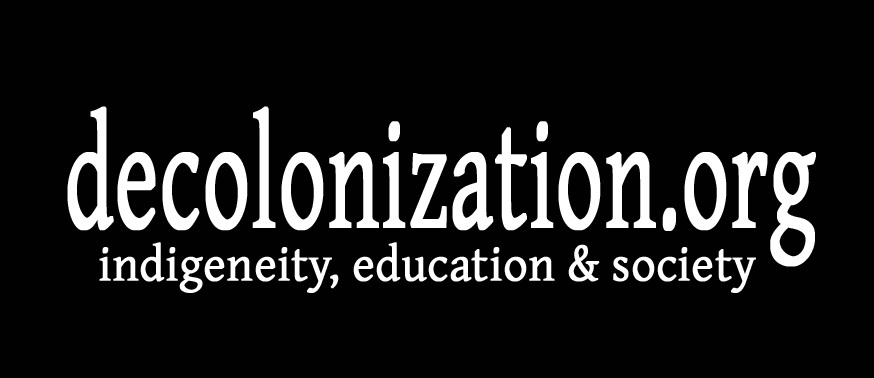


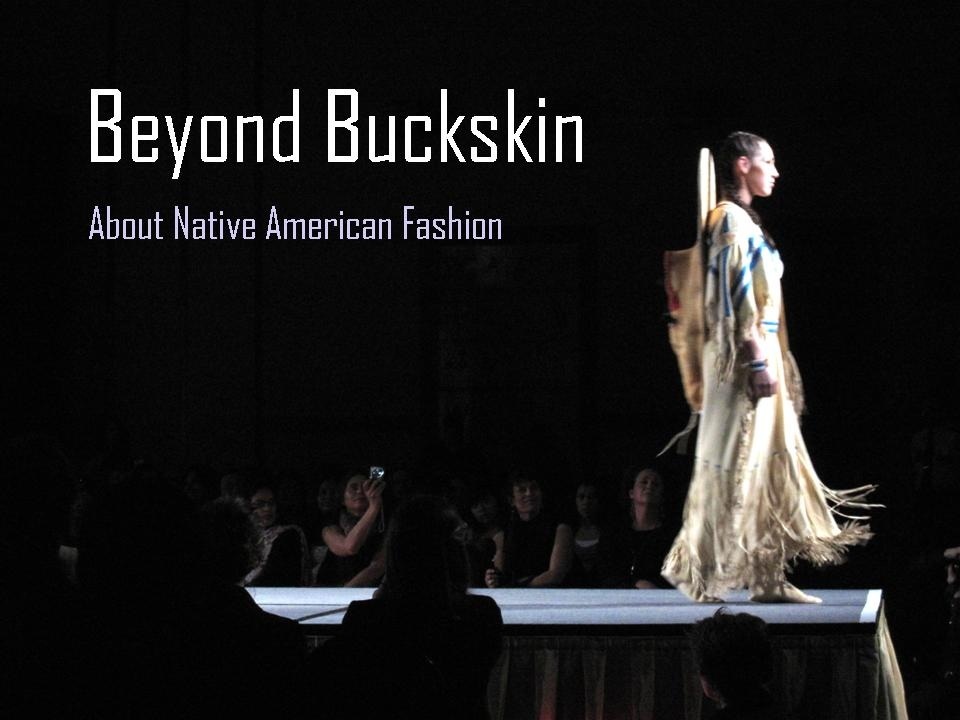

 RSS Feed
RSS Feed
